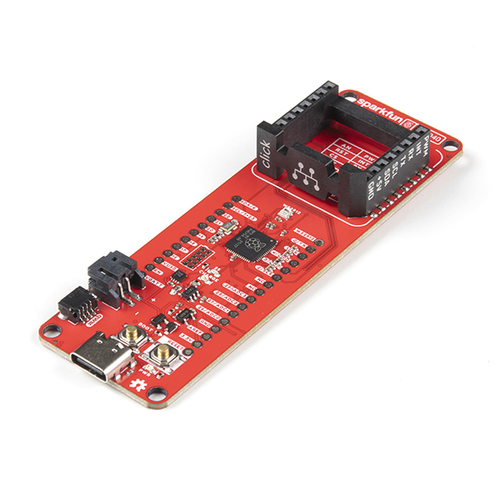
SparkFun RP2040 mikroBUS Development Board
We have ✅ 1 available of the SF-DEV-18721 in our Sydney warehouse.
The SparkFun RP2040 mikroBUS Development Board is a low-cost, high performance platform with flexible digital interfaces featuring the Raspberry Pi Foundation's RP2040 microcontroller. Besides the Thing Plus or Feather PTH pin layout, the board also includes a microSD card slot, 16MB (128Mbit) flash memory, a JST single cell battery connector (with a charging circuit and fuel gauge sensor), an addressable WS2812 RGB LED, JTAG PTH pins, four (4-40 screw) mounting holes, our signature Qwiic connectors, and a mikroBUS socket.
The mikroBUS™ standard was developed by MikroElektronika. Similar to our Qwiic and MicroMod interfaces, the mikroBUS socket provides a standardized connection for add-on Click boards™ to be attached to a development board and is comprised of a pair of 8-pin female headers with a standardized pin configuration. The pins consist of three groups of communications pins (SPI, UART and I2C), six additional pins (PWM, Interrupt, Analog input, Reset and Chip select), and two power groups (3.3V and 5V).
The RP2040 is supported with both C/C++ and MicroPython cross-platform development environments, including easy access to runtime debugging. It has UF2 boot and floating-point routines baked into the chip. While the chip has a large amount of internal RAM, the board includes an additional 16MB of external QSPI flash memory to store program code. The RP2040 contains two ARM Cortex-M0+ processors (up to 133MHz) and features:
- 264kB of embedded SRAM in six banks
- 6 dedicated IO for SPI Flash (supporting XIP)
- 30 multifunction GPIO:
- Dedicated hardware for commonly used peripherals
- Programmable IO for extended peripheral support
- Four 12-bit ADC channels with internal temperature sensor (up to 0.5 MSa/s)
- USB 1.1 Host/Device functionality
Note: Please be aware that Qwiic boards and cables, as well as Click boards are not included with the RP2040 mikroBUS Development Board. These parts will need to be purchased separately.
The SparkFun Qwiic Connect System is an ecosystem of I2C sensors, actuators, shields and cables that make prototyping faster and less prone to error. All Qwiic-enabled boards use a common 1mm pitch, 4-pin JST connector. This reduces the amount of required PCB space, and polarized connections mean you can’t hook it up wrong.
Features:
SparkFun RP2040 mikroBUS Dev. Board Features
- Raspberry Pi Foundation's RP2040 microcontroller
- 16MB QSPI Flash Memory
- JTAG PTH Pins
- Thing Plus (or Feather) Pin Form-Factor:
- USB-C Connector:
- USB 1.1 Host/Device functionality
- 2-pin JST Connector for a LiPo Battery (not included):
- 500mA charging circuit
- Qwiic Connectors (x2)
- mikroBUS Socket
- Buttons:
- Boot
- Reset
- LEDs:
-
PWR- Red 3.3V power indicator -
CHG- Yellow battery charging indicator -
25- Blue status/test LED (GPIO 25) -
WS2812- Addressable RGB LED (GPIO 08)
-
- Four Mounting Holes:
- 4-40 screw compatible
- Dimensions: 2.3" x 0.9"
RP2040 General Features:
- Dual Cortex M0+ processors, up to 133 MHz
- 264 kB of embedded SRAM in 6 banks
- 6 dedicated IO for QSPI flash, supporting execute in place (XIP)
- 30 programmable IO for extended peripheral support
- SWD interface
- Timer with 4 alarms
- Real time counter (RTC)
- USB 1.1 Host/Device functionality
- Supported programming languages
- MicroPython
- C/C++
1. Note:
GPIO 08 is not included in this count, as it passes through the WS2812 addressable RGB LED first. GPIO 07 and GPIO 23 are counted as a single GPIO because they are tied together.↩
2. Note: The GPIO pins are programmable so you can reconfigure the pins! Check out the RP2040 datasheet for more information on the GPIO functionality.↩
Documents:
- Schematic
- Eagle Files
- Board Dimensions
- Hookup Guide
- Qwiic Info Page
- GitHub Hardware Repository
- Software (SDK) Documentation:
- Online SDK Documentation
- Raspberry Pi Pico C/C++ SDK - A guide on the libraries and tools for C++ development on RP2040 microcontrollers
- Raspberry Pi Pico Python SDK - A guide on the MicroPython environment for RP2040 microcontrollers
- Hardware Component Information:
- Software Development Platforms for the RP2040:
-
MicroPython
- Example code to accompany the Get Started with MicroPython on Raspberry Pi Pico book
-
Pico C/C++ SDK
- Example codes
-
Beta Libraries
- Example code for the beta libraries
- Tools and Resources:
- RP2040 Boot ROM - Source code for the USB mass storage device emulation
- Picotool - Inspecting RP2040 binaries in BOOTSEL mode
- Debugging Probe Configuration
- OpenOCD Debugger
- pico-project-generator - GUI tool to automatically generate a Pico C/C++ SDK project
-
UF2 Files- Just drag-and-drop onto your RP2040 board
- C/C++ Files:
- MicroPython Files:
- Utility Files: microcontroller
- Debugging w/ picoprobe - Debugging with another RP2040 microcontroller
- Reset flash memory - Clears flash memory from board
-
MicroPython
Videos
The SparkFun RP2040 mikroBUS Development Board appears in the following collections:
SKU SF-DEV-18721
by SparkFun

